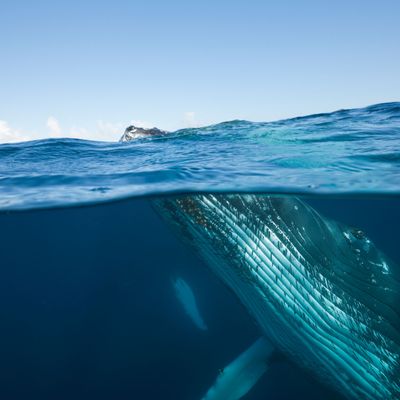
Human beings have already discovered more oil and gas than we can burn without bringing about our civilization’s untimely death.
Nevertheless, the market’s insatiable thirst for petroleum profits has persisted. And even as fracking has provided the U.S. with more natural gas than it knows what to do with, American energy companies have turned their lustful eyes back toward the sea.
These companies are eager to search for untapped, deepwater fossil fuels by firing dozens of air cannons into the ocean, five or six times a minute, for months on end. These blasts of compressed air travel miles into the seabed, producing echoes that offer indications about the presence of buried oil and gas deposits.
They also, shockingly, have an adverse effect on marine life. The Atlantic’s Ed Yong offers this breezy rundown of the practice’s collateral damage:
It can substantially injure the internal organs of fish, as well as the hair cells that allow them to hear. It can damage the organs that allow invertebrates, from rock lobsters to giant squid, to maintain their balance. It slows development, induces damaging levels of long-term stress, forces animals to seek shelter instead of feeding, prevents them from spotting predators, drowns out the sounds that they use to attract mates, and stops larvae from finding their way to the right habitats. It disrupts the lives of blue and other giant whales, forcing them to abandon their habitats and increasing the risk of calves being separated from their mothers.
Perhaps most alarmingly, last month, a new study showed that airgun blasts can kill zooplankton—the microscopic animals that form the basis of the ocean’s food webs. After a day of blasts, the numbers of dead plankton rose by two to three times, and the larvae of krill—the little crustaceans that large whales depend upon—were completely annihilated. And that experiment involved a single airgun, rather than the large arrays that will be towed by actual ships.
So, one the one hand, seismic air gun blasting makes it easier for energy companies to locate untapped oil reserves that humanity can’t afford to burn without assuring its own destruction. On the other hand, the technique may undermine the basis of all ocean life — along with that of many coastal economies. Here’s Yong again:
It is easy to paint environmental issues as fights between moralizing tree-huggers and hard-working business-owners. But the opposition to airgun testing transcends such caricatures. “There is no separation between the interests of environmentalists and the business community,” says Knapp, whose bipartisan organization represents 41,000 businesses and 500,000 commercial fishing families who oppose seismic testing. They do so because the blasts can harm and displace fish, greatly reducing the populations that both commercial and recreational fishers depend upon. In other parts of the world, catch rates for species like cod and rockfish have fallen by 50 to 70 percent in the days after seismic tests. The tourism industry can also be affected, since airgun noise can potentially force whales to beach themselves. “Tourists don’t like to see dying marine mammals on the beach,” Knapp says.
After weighing these costs and benefits, the Obama administration decided to ban drilling in the Atlantic, and rejected six applications for seismic drilling.
But the Trump administration has reached a different conclusion. In late April, the president ordered Secretary of the Interior Ryan Zinke to expedite the consideration of applications for seismic exploration, as part of Trump’s “America-First Offshore Energy Strategy.” Zinke proceeded to order reevaluations of the permits denied under Obama. And, on June 5, the National Marine Fisheries Service provided five companies with authorization to deploy their air guns — after a 30-day period of public comment. That period was set to end this week, but has since been extended another 15 days.
The move has inspired bipartisan pushback in Congress, as few coastal Republicans are ideological enough to cheer on multinational oil companies as they undermine local fishers. Last week, a group of 103 House Democrats and Republicans sent Zinke a letter demanding an “immediate halt to the permitting process.”
If the permits are approved anyway, air guns could begin terrorizing whales and killing zooplankton all along the Eastern Seaboard by autumn’s end.






























